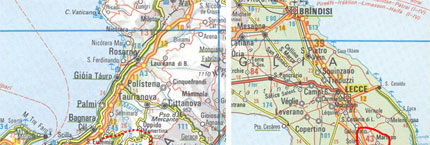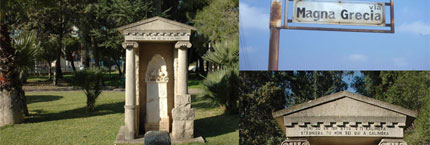Apart from the monuments and the temples spread all over Southern Italy
and Sicily, the most touching element that has remained in the region
are the last traces of the Greek language, which are maintained today
only in the spoken language. In the region of Apulia (Puglia) south of
the city of Lecce, there are nine municipalities of Greek roots, in the
villages of Martano, Kalimera, Melpigniano etc. (Grecia Salentina).
Another core of the Greek language was maintained in the region of Calabria,
in the mountains of Aspromonte (1955 meters in height) and in other nine
villages, such as Chorio, Bova, Condofuri (Bovesia) etc. The two regions
are at a distance of about 600 km from each other and had no contact
whatsoever over the centuries.
 |
The region of Calabria (left) and of Apulia
(Salento) on the right, where the Greek language is preserved
today through a unique dialect named «Grecanica». (The dotted
line encircles the Greek speaking zone in the 15th century, and
the continuous one presents the Greek speaking zone of the 20th
century.)
© Maps Ĺuro Atlas-Kummerly+Frey |
| |
 |
| Funerary stele offered by the Municipality of
Athens in 1961 to Kalimera village, commemorating the common
origin of these two places. In Grecanica it reads «ZENI SO EN
ISE ETTU STI KALIMERA» («You are no stranger here in Kalimera»). |
| |
According to research conducted for the origin of the language, it
was evident that it is rooted in the ancient colonization and the Dorian
dialect; it was once again revived with the arrival of the Byzantines
in the region and also due to the nuns that came from Asia Minor and
Cappadokia (in 1000 A.D.). Another boost to the language occurred at
the beginning of the 16th century, when Greeks and Albanians (Arbanites)
during the advance of the Turks that occupied all of Greece, especially
after the fall of Koroni
4 (in 1534), fled to the South of Italy.
The Greek language in the centuries to come receded progressively because
it was mixed with the Italian language, as did Orthodoxy, since Catholicism
absolutely prevailed.
4. City on the western leg of the Peloponnese.